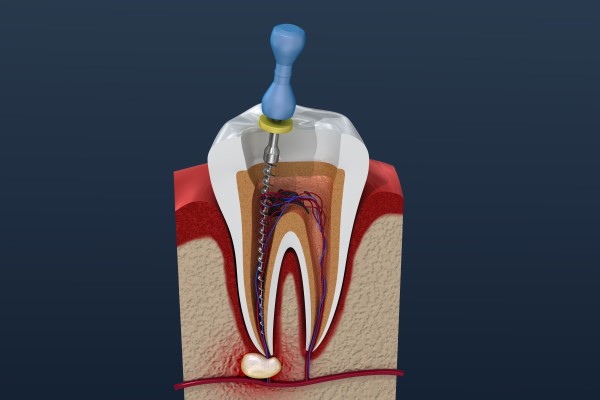What Can Happen if You Avoid a Root Canal Treatment

When a tooth root becomes infected by bacteria, a root canal treatment may be recommended to remove the infected tooth tissue. While some may fear this procedure, the truth is there is more to worry about in the consequences of not receiving a necessary root canal than of getting one in the first place. Failing to treat an infected tooth can lead to painful and serious repercussions.
4 possible consequences of not getting a root canal treatment
A root canal procedure is recommended and performed only when there is an oral health need and other procedures cannot fix the problem. Not having this suggested dental procedure done can lead to more advanced problems.
1. Serious pain and discomfort
When the infection in the pulp of a tooth is left untreated, the result is often extreme pain, uncomfortable sensitivity to hot and cold substances, and the inability to eat certain foods. The pain and discomfort of an infected tooth can further cause headaches and irritability. Many people with severe tooth and mouth pain and discomfort get less enjoyment out of eating and other social activities as well. Having a root canal can ensure that this level of pain and discomfort never occurs.
2. Loss of the tooth
Another consequence of not having a root canal to rid a tooth of infected material is needing to have the entire tooth removed instead. If an infection is allowed to fester and continue for too long, then the tooth may no longer be salvageable and would have to be extracted. Tooth extraction typically is more difficult and takes longer to heal than
root canal treatment. There is also the additional issue of deciding whether to replace the tooth, which requires more dental procedures. Saving and keeping as many original teeth as possible is generally preferred.
3. Spread of infection
Infections grow and spread when not taken care of properly with a root canal. Not only can tooth infections spread to other teeth, but also to other parts of the mouth such as the gums, cheeks, and tongue. It is also not uncommon to see an infection spread to other parts of the body as well, such as the throat, neck, stomach, and lungs. In some cases, tooth infection has even spread to the brain and bloodstream, causing dangerous issues such as sepsis.
4. Formation of an abscess
If a tooth infection is not taken care of in time, an abscess can develop. An abscess is a ball of pus formed from a bacterial infection. Abscesses are painful, cause horrible bad breath, and are often accompanied by a fever. Considered dental emergencies, they must be drained before they can cause serious illness, and a course of antibiotics often must be prescribed. Once an abscess has formed, surgery on the tooth and other parts of the mouth may be necessary.
Frequently asked questions
Now that you know what the consequences are for not having a root canal, you may have some additional questions.
1. What exactly occurs during a
root canal treatment?
The dentist drills a small hole into the tooth to expose the infected pulp. After removing the damaged tissues, the dentist will thoroughly clean the canal. Right after the procedure, a temporary filling will be placed to fill in the hole. After a few days, the dentist will examine the tooth and then replace the temporary filling with a permanent one. The dentist may also place a crown on top of the tooth, so it matches your natural teeth and protects the affected tooth from future infection.
2. Are there any other alternatives to a root canal treatment?
A root canal is necessary because the pulp of the tooth, which contains the nerves, blood vessels, and other tissues, is infected. No other dental procedure, such as a filling, can fix the extent of the damage. Pain medication and antibiotics are only temporary solutions and do not treat the cause of the infection. A root canal treatment is the only viable option at this point.
The thought of having a root canal treatment for a deep infection may cause you to avoid the procedure for as long as possible. However, not only can the infection get worse, but it can also lead to additional serious oral and general health complications. Stop these consequences from ever having a chance of coming to fruition. If you need a root canal treatment, schedule it as soon as possible to preserve your oral health.
Related Posts
Root canal treatment is a common dental procedure that can help save your natural teeth and prevent the need for extractions. While many people dread this treatment, it's not as scary as you may think! However, aftercare is just as important as the procedure itself. In this blog post, we'll share some top tips to…
It's a dental emergency that no one wants to experience - a root canal that is infected and causing severe pain. But if you're in this situation, don't worry! This article will provide you with a complete step-by-step guide on handling an infected root canal, so you can get the relief you need as quickly…
Experiencing a toothache can be agonizing, demanding swift relief until professional dental care is sought. In this guide, we'll explore twelve at-home toothache remedies that offer temporary solace while emphasizing the crucial role of consulting an emergency dentist in Boca Raton for definitive care. From saltwater rinses to herbal applications, these remedies aim to provide…
Do you know what to do if you suddenly experience a dental emergency? From a chipped tooth to severe toothache, dental emergencies can happen at any time and leave you in excruciating pain. That's why it's important to seek immediate attention from an emergency dentist who can treat your condition promptly. In this blog post,…
